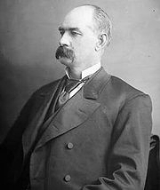
John William Bell
Encyclopedia

Ontario
Ontario is a province of Canada, located in east-central Canada. It is Canada's most populous province and second largest in total area. It is home to the nation's most populous city, Toronto, and the nation's capital, Ottawa....
political figure. He representing Addington
Addington (electoral district)
Addington was a federal electoral district in Ontario, Canada, that was represented in the Canadian House of Commons from 1867 to 1904.It was created in the British North America Act of 1867....
in the Canadian House of Commons
Canadian House of Commons
The House of Commons of Canada is a component of the Parliament of Canada, along with the Sovereign and the Senate. The House of Commons is a democratically elected body, consisting of 308 members known as Members of Parliament...
as a Conservative
Conservative Party of Canada (historical)
The Conservative Party of Canada has gone by a variety of names over the years since Canadian Confederation. Initially known as the "Liberal-Conservative Party", it dropped "Liberal" from its name in 1873, although many of its candidates continued to use this name.As a result of World War I and the...
member from 1882 to 1891 and from 1896 to 1901.
He was born in Camden Township in Upper Canada
Upper Canada
The Province of Upper Canada was a political division in British Canada established in 1791 by the British Empire to govern the central third of the lands in British North America and to accommodate Loyalist refugees from the United States of America after the American Revolution...
in 1838. He obtained a teaching certificate and taught for a number of years and then began farming. He continued to teach religious school and hold a weekly Bible class for the local Methodist
Methodism
Methodism is a movement of Protestant Christianity represented by a number of denominations and organizations, claiming a total of approximately seventy million adherents worldwide. The movement traces its roots to John Wesley's evangelistic revival movement within Anglicanism. His younger brother...
church. Bell served as reeve in the township and, in 1879, served as warden for Lennox and Addington counties
Lennox and Addington County, Ontario
Lennox and Addington County, Ontario is a county and census division of the Canadian province of Ontario. The county seat is Greater Napanee. It is located in the subregion of Southern Ontario named Eastern Ontario.It includes the following municipalities:...
. In 1889, he supported a motion by William Edward O'Brien
William Edward O'Brien
William Edward O'Brien was a lawyer, farmer, editor and political figure in Ontario, Canada. He represented Muskoka and Parry Sound in the Canadian House of Commons from 1882 to 1896 as a Conservative member....
which opposed the Jesuit
Society of Jesus
The Society of Jesus is a Catholic male religious order that follows the teachings of the Catholic Church. The members are called Jesuits, and are also known colloquially as "God's Army" and as "The Company," these being references to founder Ignatius of Loyola's military background and a...
s' Estates Act. This legislation was opposed by the Orange Order
Orange Institution
The Orange Institution is a Protestant fraternal organisation based mainly in Northern Ireland and Scotland, though it has lodges throughout the Commonwealth and United States. The Institution was founded in 1796 near the village of Loughgall in County Armagh, Ireland...
, of which Bell was a member, because the pope
Pope
The Pope is the Bishop of Rome, a position that makes him the leader of the worldwide Catholic Church . In the Catholic Church, the Pope is regarded as the successor of Saint Peter, the Apostle...
would be involved in resolving the disposition of these properties in Quebec
Quebec
Quebec or is a province in east-central Canada. It is the only Canadian province with a predominantly French-speaking population and the only one whose sole official language is French at the provincial level....
. Bell also opposed legislation restoring school rights for Roman Catholics
Roman Catholic Church
The Catholic Church, also known as the Roman Catholic Church, is the world's largest Christian church, with over a billion members. Led by the Pope, it defines its mission as spreading the gospel of Jesus Christ, administering the sacraments and exercising charity...
in Manitoba
Manitoba
Manitoba is a Canadian prairie province with an area of . The province has over 110,000 lakes and has a largely continental climate because of its flat topography. Agriculture, mostly concentrated in the fertile southern and western parts of the province, is vital to the province's economy; other...
. In 1900, Bell was elected president of the World Council in New York City
New York City
New York is the most populous city in the United States and the center of the New York Metropolitan Area, one of the most populous metropolitan areas in the world. New York exerts a significant impact upon global commerce, finance, media, art, fashion, research, technology, education, and...
for the Orange Order.
He died on his farm in Camden Township in 1901 while still in office as an MP.

